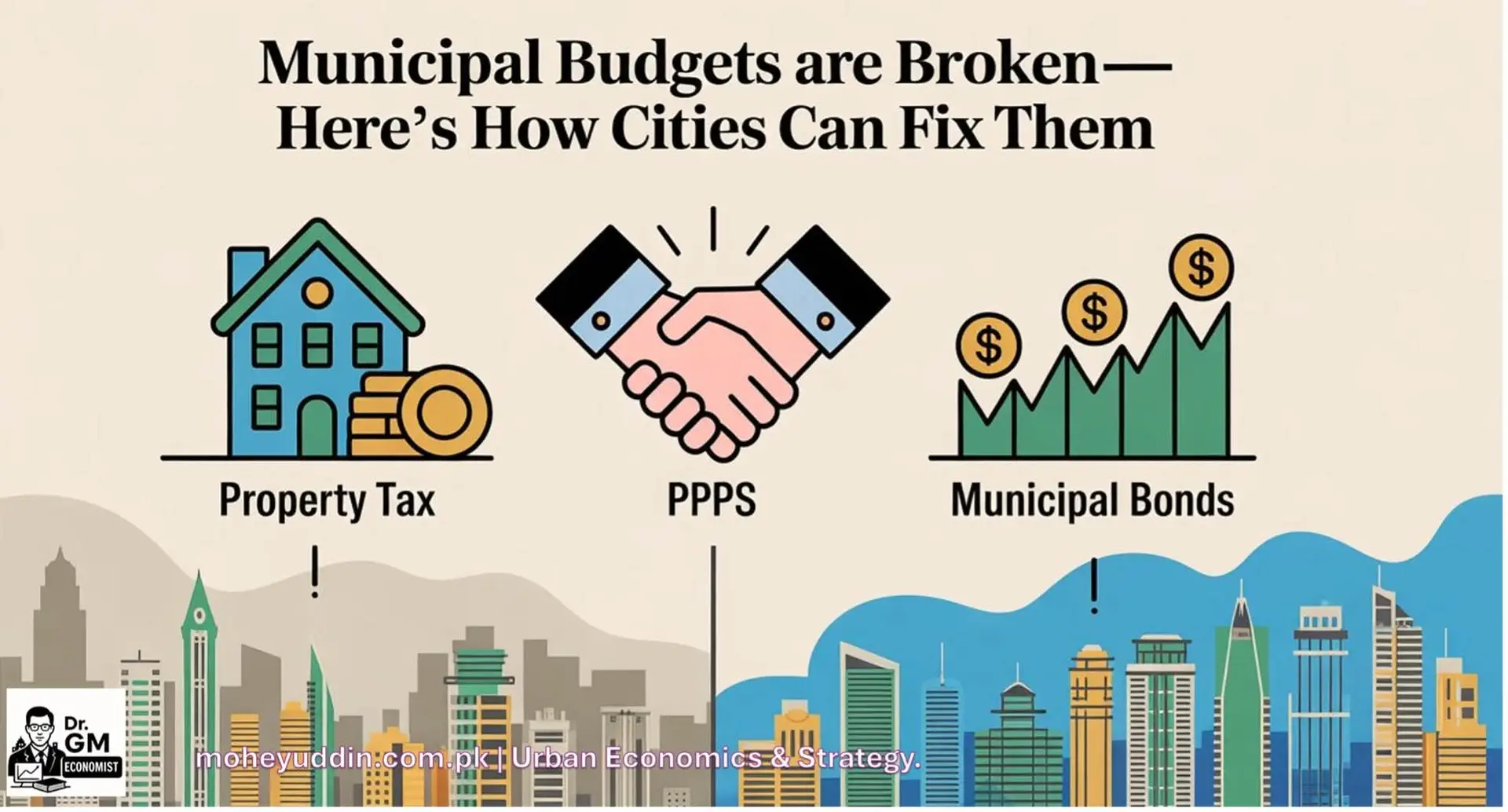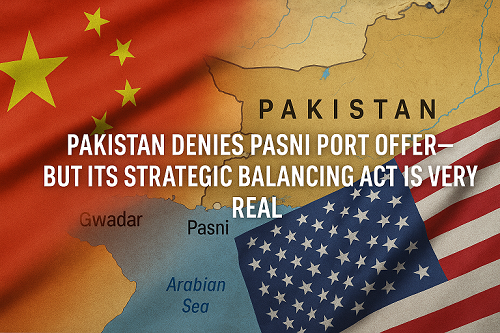Municipal Finance are Broken? Here’s How Cities Can Fix Their Budget!
By: Dr. Ghulam Mohey-ud-din
Every city is only as strong as its balance sheet. Roads, transit lines, water pipes, and parks don’t simply appear—they are funded, maintained, and expanded through municipal budgets. Yet in many South Asian cities like Karachi and Lahore, the budgetary model is broken: cities depend on transfers from higher tiers of government while failing to unlock their own revenue potential. Compare this to Dubai, where municipal revenues are diversified and actively leveraged to finance urban growth.
The gap isn’t just about money—it’s about governance, autonomy, and the ability of cities to shape their own futures.
The Problem: Municipal Finance in Pakistan
- Overdependence on transfers: Pakistani cities are highly dependent on provincial allocations, leaving budgets unpredictable.
- Weak property tax system: The Urban Immovable Property Tax accounted for only 3.83% of total provincial tax revenue in FY21, and a mere 0.1% of GDP (Dawn).
- Low per capita collection: In Khyber Pakhtunkhwa, property tax yields barely USD 0.10 per person, compared to many Indian states that collect several dollars per capita (Dawn).
- Large informal sector: Roughly 25–35% of Pakistan’s economy is undocumented, shrinking the municipal tax base (IFC CPSD Report).
- Weak fiscal autonomy: Cities lack the power to borrow, issue bonds, or directly leverage their revenue streams.
The result is chronic underfunding of infrastructure, delayed maintenance, and widening service gaps.
Case Study 1: Karachi & Lahore’s Municipal Finance
- Karachi contributes about 25% of Pakistan’s GDP (Wikipedia), yet its local government retains control over only a sliver of financial flows.

- A 2022 study found that Karachi’s Saddar market alone generated PKR 77 billion in income tax, nearly 79% of the city’s total market-based income tax—but all of it went to federal accounts, not the municipality (PIDE).
- Lahore faces similar constraints: low property tax yields, outdated cadastral records, and a rapidly expanding urban population straining underfunded services.
Both cities highlight the paradox of high economic output but weak municipal revenue capture.

Case Study 2: Dubai
Dubai illustrates the opposite model:
- Diversified revenues: Municipality fees, property levies, and service charges constitute a large part of the revenue base (IMF).
- PPP framework: Dubai has actively used public–private partnerships in transport, waste management, and utilities to expand infrastructure without overburdening the budget (UAE Ministry of Finance).

- Borrowing powers: The city leverages debt markets for long-term infrastructure, supported by credit ratings and transparent financial disclosure.
The result: sustained urban investment even during periods of oil-price volatility.
Three Levers to Fix Municipal Budgets
1. Modernise Property Tax
- Regularly update property valuation rolls using market prices and GIS mapping.
- Expand coverage into informal settlements with pragmatic assessment systems.
- Dedicate visible improvements (parks, waste management) to build taxpayer trust.
➡️ Stat to note: Pakistan’s property tax contributes 0.1% of GDP, compared to an emerging-market average of 1–2% of GDP (Dawn).
2. Unlock Local PPPs
- Develop small, replicable PPP pilots: solar street lighting, parking, and solid waste.
- Create regulatory oversight bodies to reduce corruption and rent-seeking.
- Scale up to major projects once capacity and trust are established.
➡️ Example: The IFC notes Pakistan’s PPPs are concentrated in energy and ports, with little activity in municipal services—an untapped opportunity (IFC CPSD Report).
3. Enable Borrowing Powers
- Create a municipal bond framework under provincial law.
- Permit large cities to issue debt against future property tax and fee revenues.
- Enforce strict disclosure and credit ratings to ensure discipline.
➡️ Global comparison: Indian cities like Pune have issued municipal bonds successfully, raising funds for water and sewerage upgrades. Pakistan has yet to replicate this model

The Way Forward: A Governance Shift
Reforming municipal finance is not just about technical fixes—it requires a governance shift. Provincial governments must treat cities as economic engines, not administrative appendages. That means:
- Legal reform to grant fiscal autonomy.
- Capacity building for local finance teams.
- Citizen engagement via participatory budgeting.
Conclusion: From Survival to Growth
Karachi and Lahore today operate on survival budgets. Without reform, they will fall further behind peers like Dubai, unable to finance the infrastructure their citizens demand.
The path forward lies in property tax modernisation, local PPPs, and borrowing powers—tools that can transform broken budgets into engines of growth.
The question is not whether reform is possible, but whether Pakistan’s provincial governments are willing to let cities take charge of their financial futures.










Leave a Reply